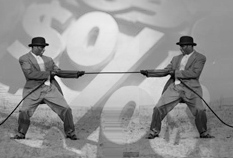
Why "Me Too" Fails
| Продажи | ||||
| Sales.com | ||||
| Competi... | ||||
by Graham Denton
The former president of Coca-Cola, Don Keough, once observed, "We have long held that one of the commandments for losing in business is to focus on the competitor rather than the customer." That's a good observation, and it makes an important point about sales strategy. To succeed in today's fiercely competitive arenas, you have to be proactive, not reactive. You must actively strive to differentiate yourself in the customer's mind, rather than defensively responding to a competitor's differentiation.
 This
distinction is made effectively in The New Strategic Selling, the recent
update of the Miller Heiman sales classic by Stephen Heiman, Diane Sanchez,
and Tad Tuleja. In a new chapter on competition, they point out that,
when you react obsessively to what your competitors are doing, the best
message you can send your customers is "We are better." Even that isn't
a very convincing argument for adopting your solution over someone else's,
but it gets worse. Often what your customer hears in this situation is
"Me too." When that happens, you get the short end of several negative
repercussions.
This
distinction is made effectively in The New Strategic Selling, the recent
update of the Miller Heiman sales classic by Stephen Heiman, Diane Sanchez,
and Tad Tuleja. In a new chapter on competition, they point out that,
when you react obsessively to what your competitors are doing, the best
message you can send your customers is "We are better." Even that isn't
a very convincing argument for adopting your solution over someone else's,
but it gets worse. Often what your customer hears in this situation is
"Me too." When that happens, you get the short end of several negative
repercussions.
First, a "me too" strategy allows your competitor to write the rules of engagement - to define which standards a common prospect should use in comparing your solutions. This positions you as a Johnny come lately who believes he can beat the front runner at the front runner's own game. Even if you think you can, you're in a one-down position. Unless your customer likes buying from underdogs, that's not good.
Second, because it focuses on the competition's strengths, a "me too" message unavoidably calls attention to your weaknesses. Rather than showing the prospect what you can do, it shows him only what you can undo. As the Miller Heiman book puts it, "Unless what they want is a bodyguard, that decodes as a weakness."
Third, it invites a price war. When you say "We're just as good as X," one common response from X is "But we're cheaper." The result is mutual reactivity, where both suppliers lose.
Fourth, it makes you look uncreative. When a competitor brags about the features or benefits of its product and all you can say is "We have the same thing, only better," the customer may quite reasonably conclude that you have no ideas of your own. That makes you, at best, a skillful knock-off artist, utterly dependent on your opponent's next move.
Fifth, it puts your concerns ahead of your customers'. By focusing on what you have rather than on what the customer needs, a "me too" strategy makes it difficult for you to come up with a tailored solution. If a customer senses that this is the case, you're no longer in the running.
An effective competitive strategy makes you stand out. It tells the customer that you are unique in the field because you bring something incomparable - literally, something that can't be compared - to the table. It might be a feature, a benefit, a service, or some other contribution. But whatever it is, if it's going to work in your favor, it must be yours. It can't be a competitor's hurdle for you to jump over.